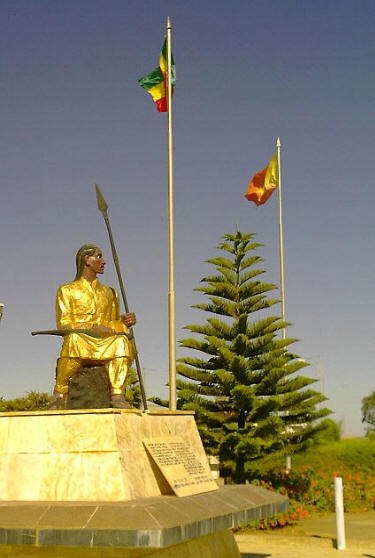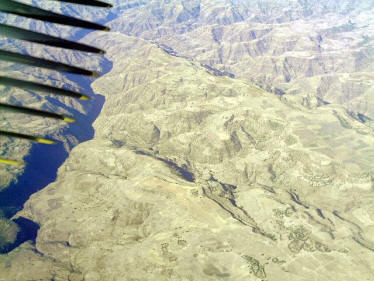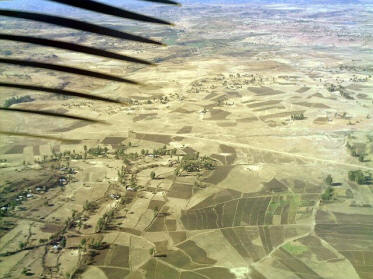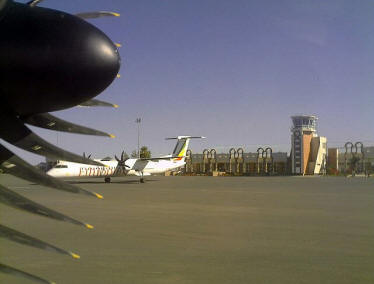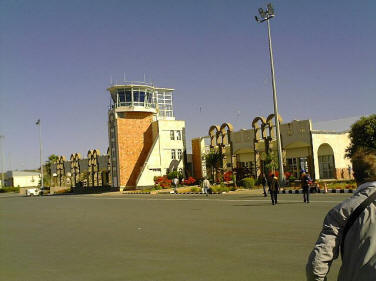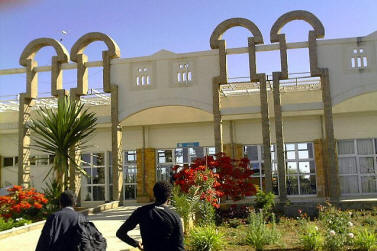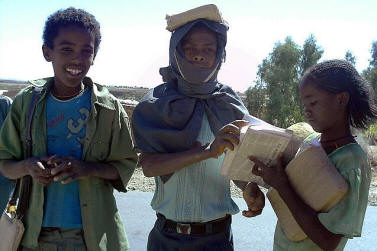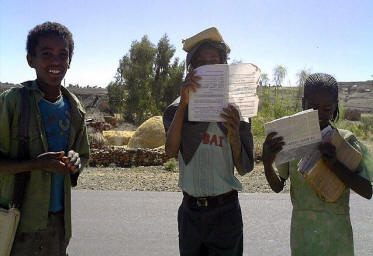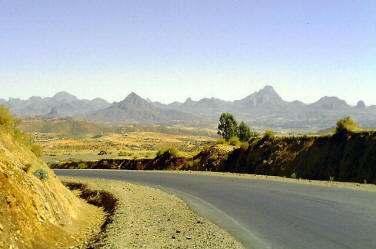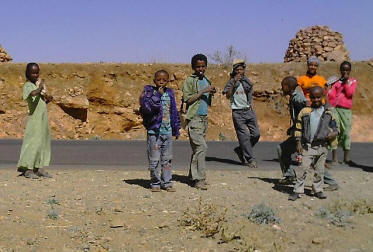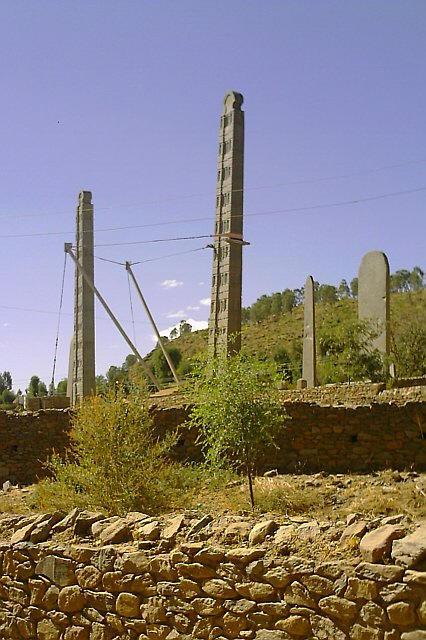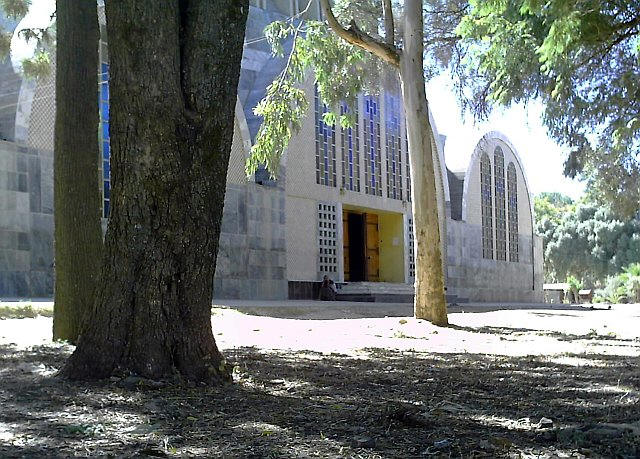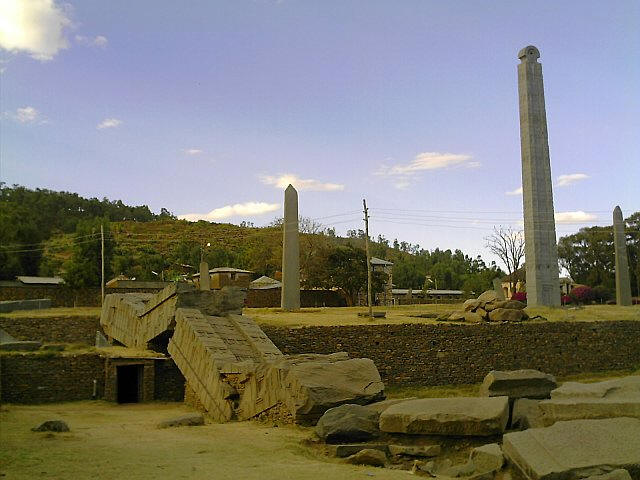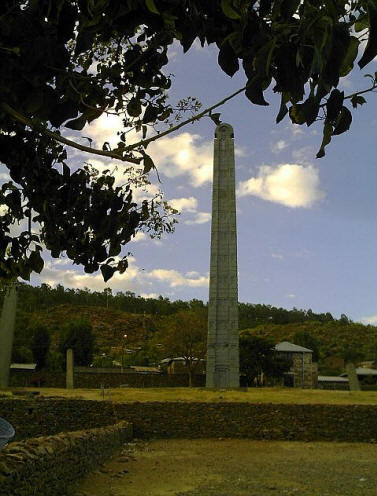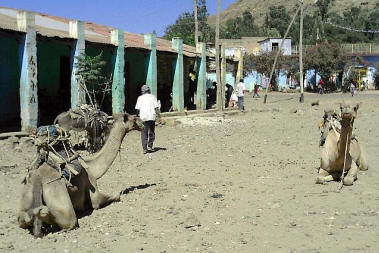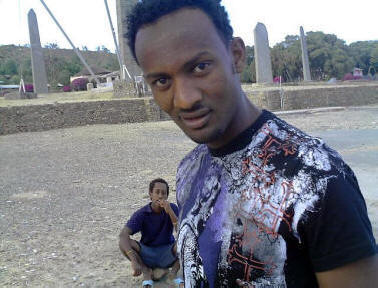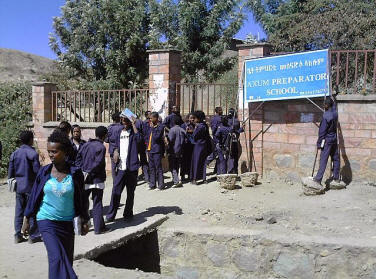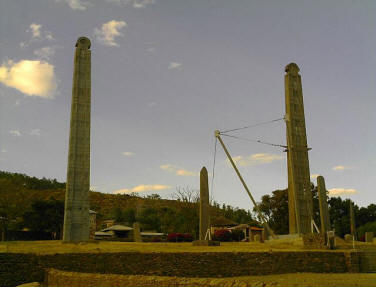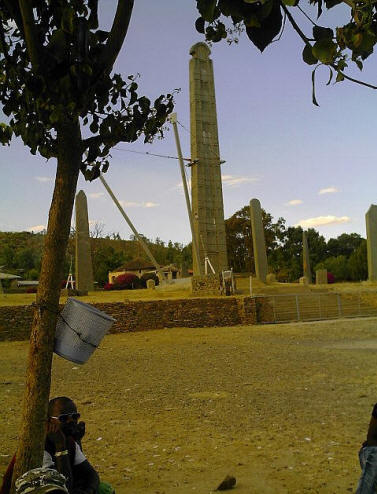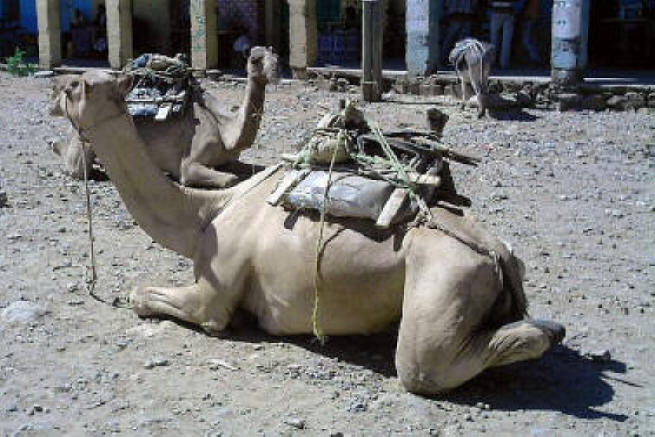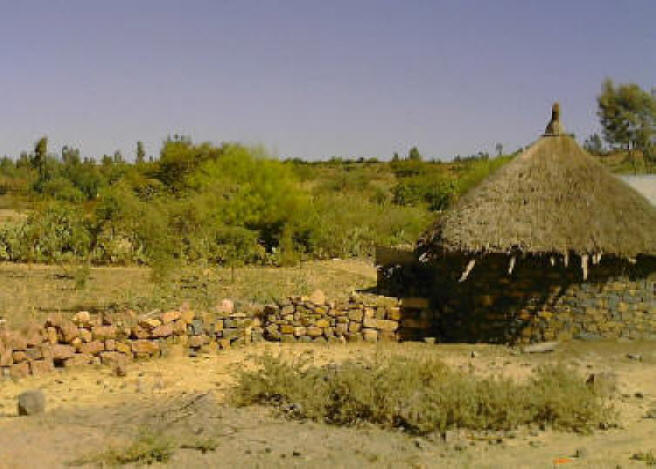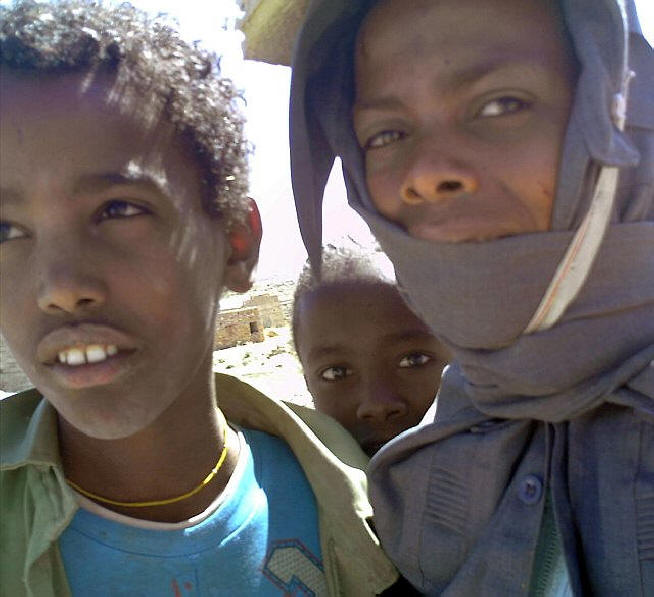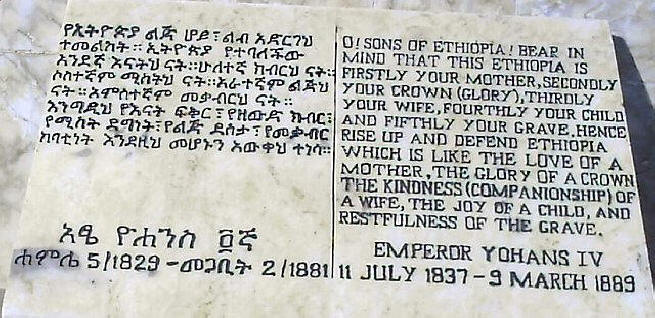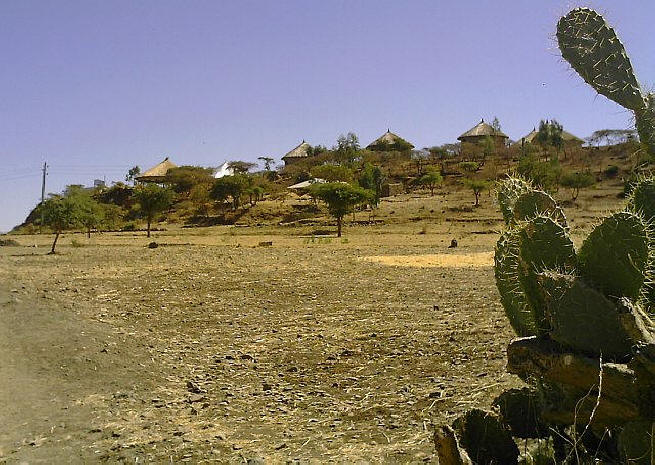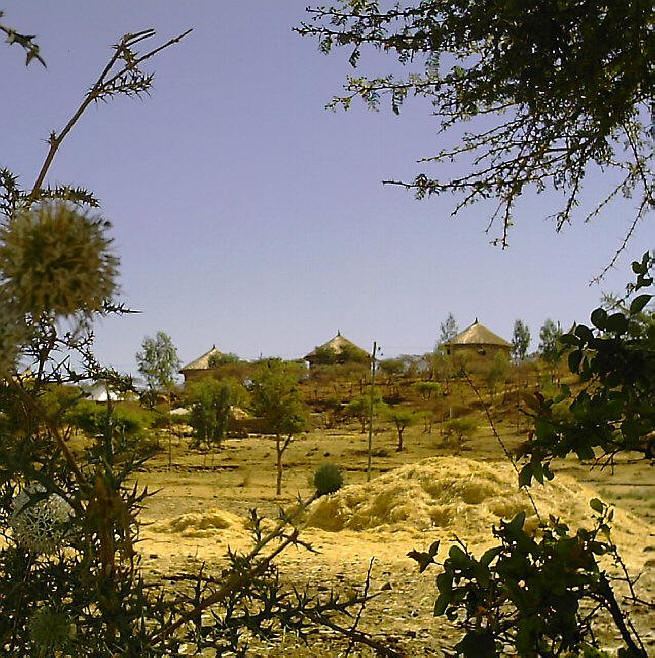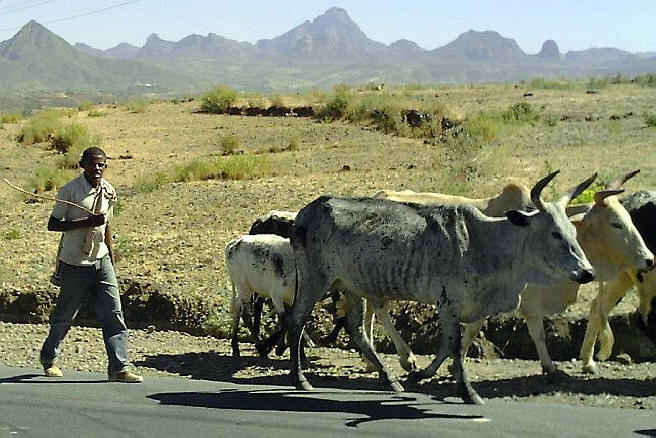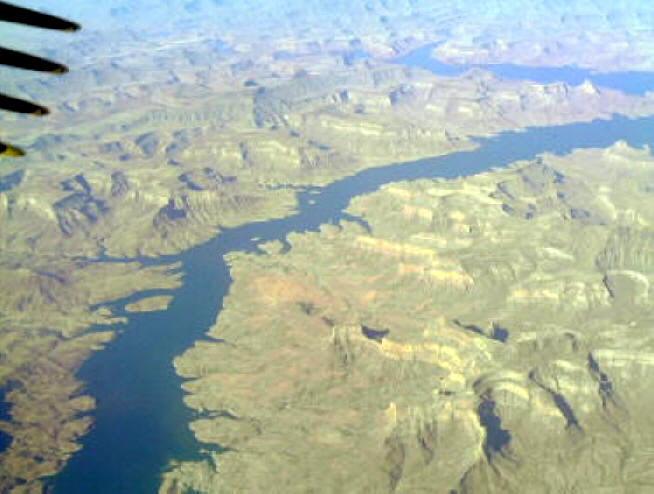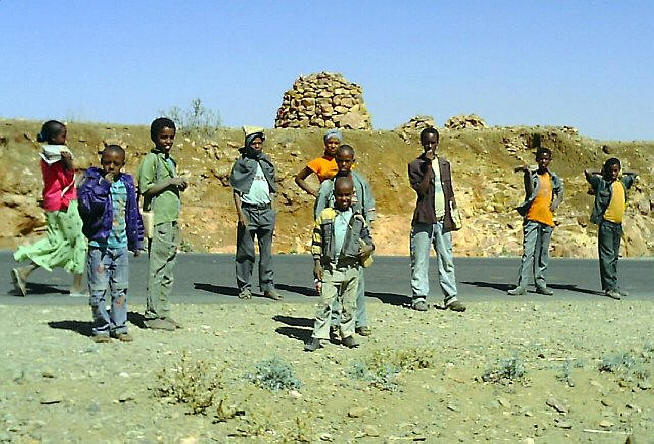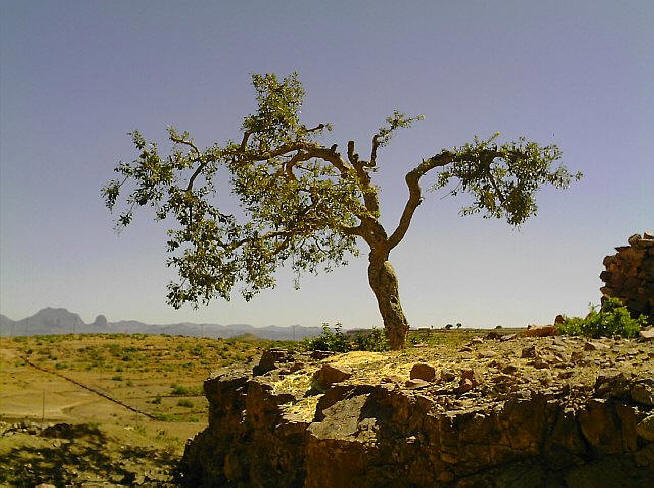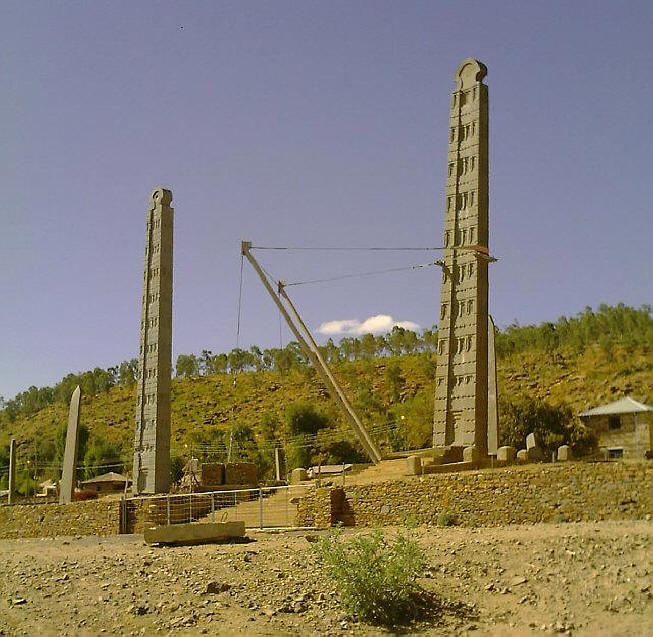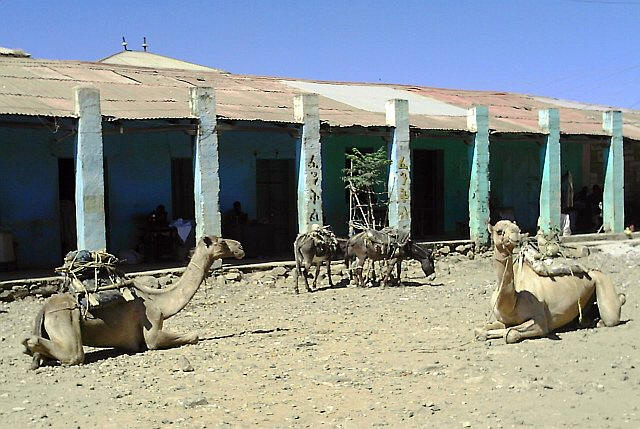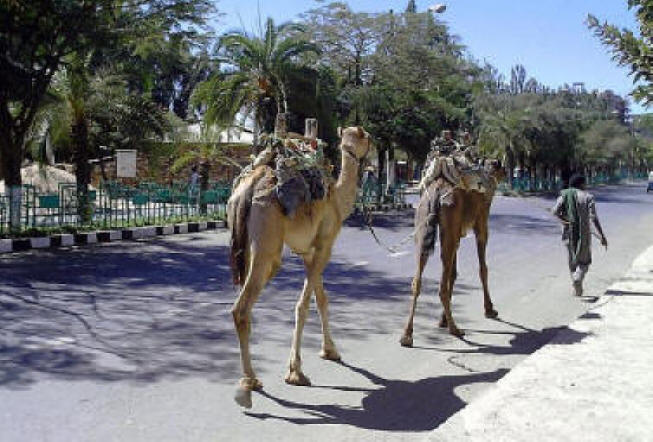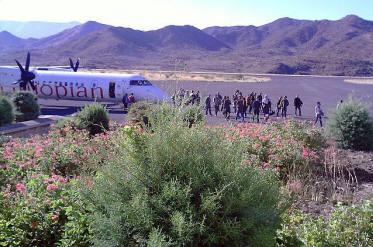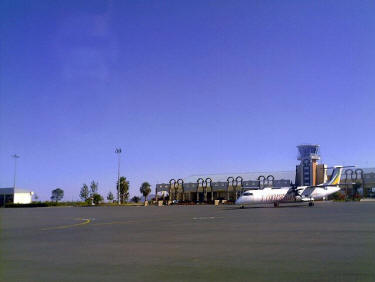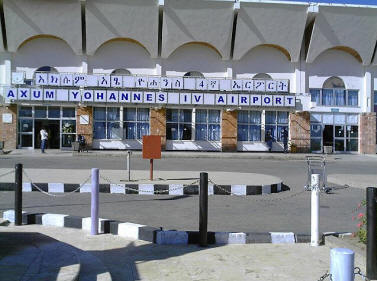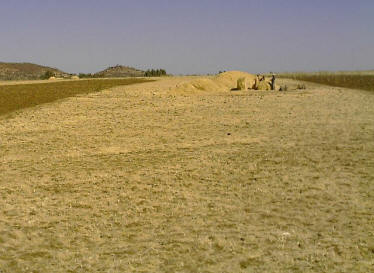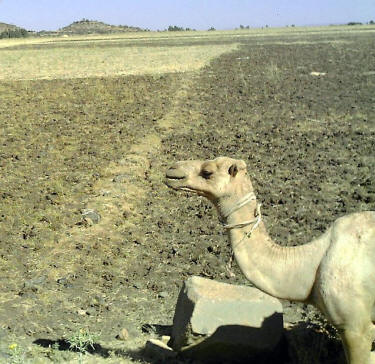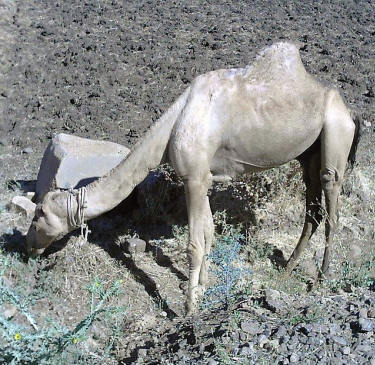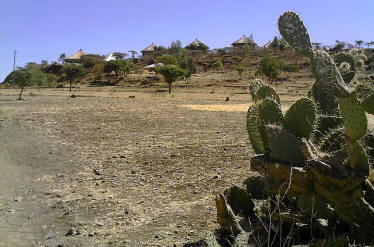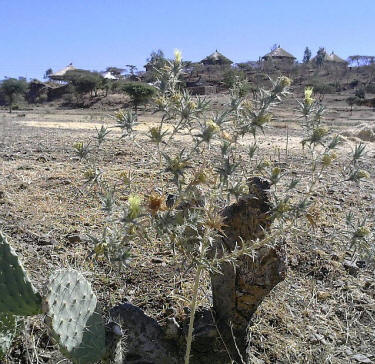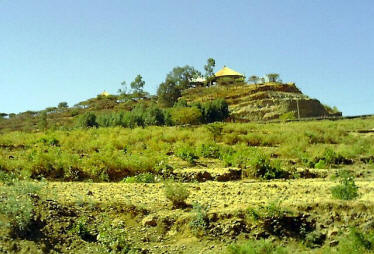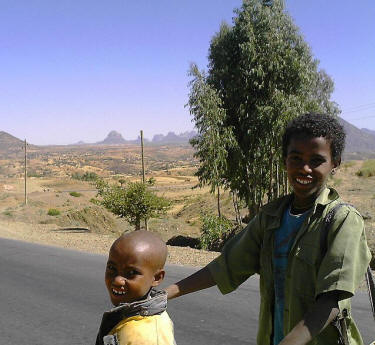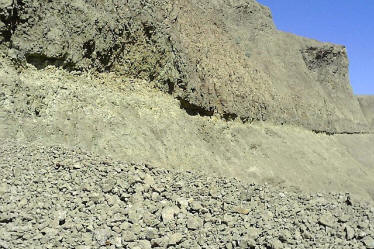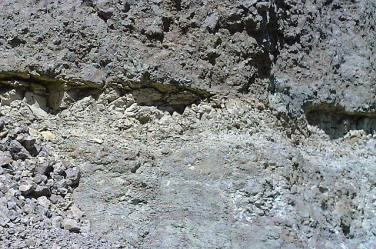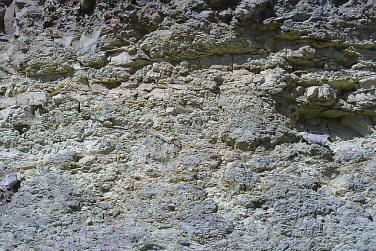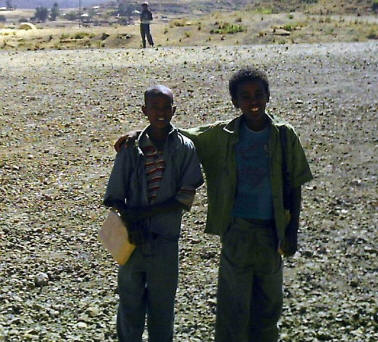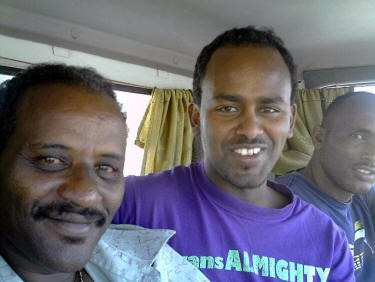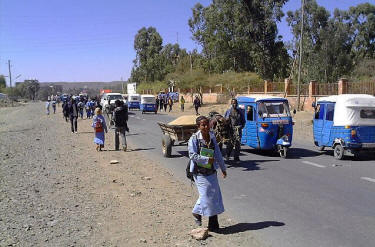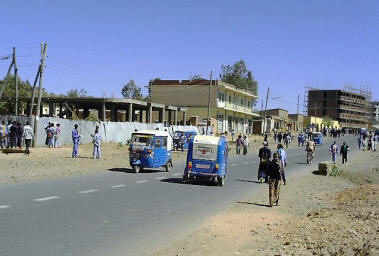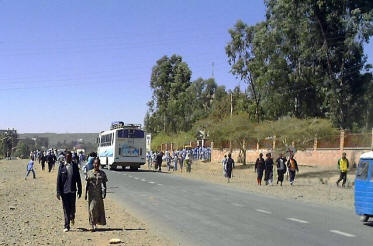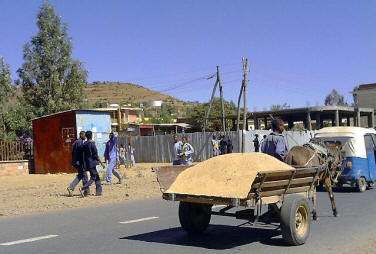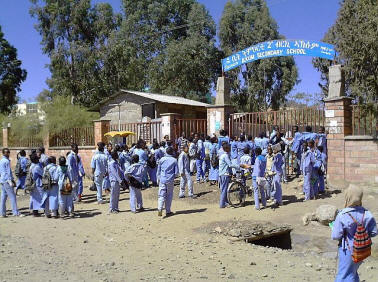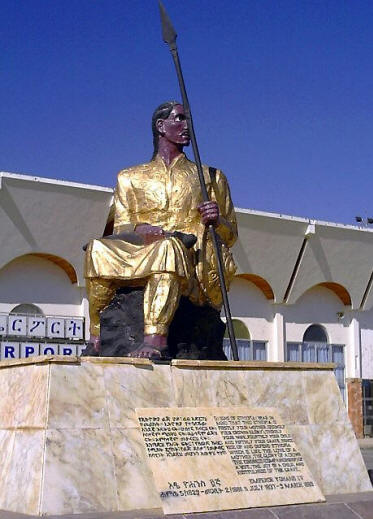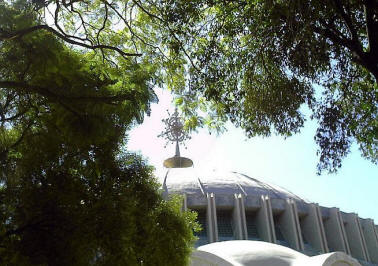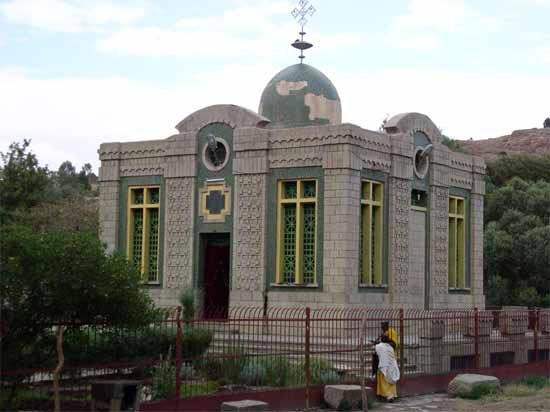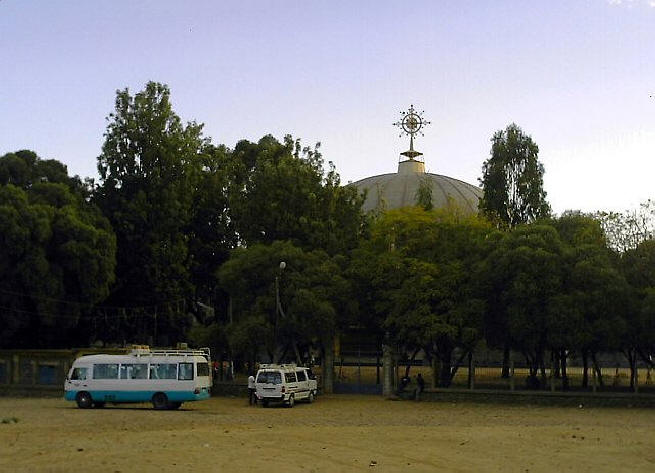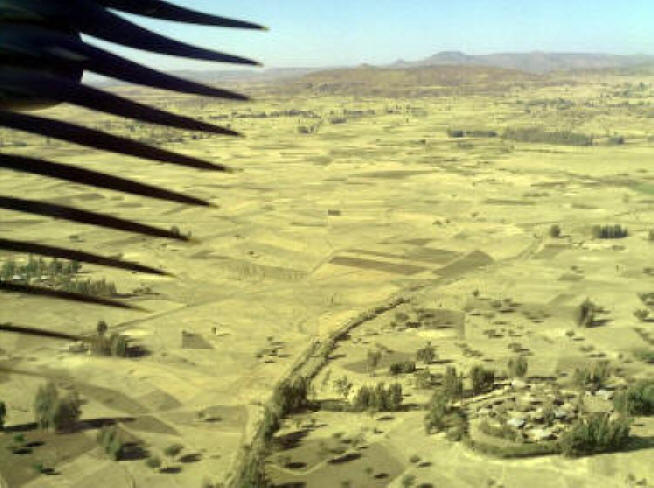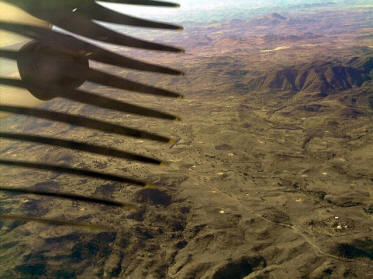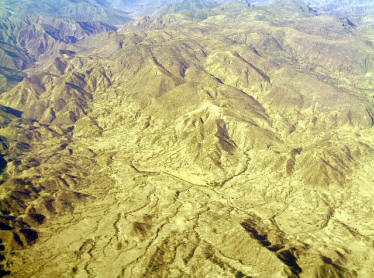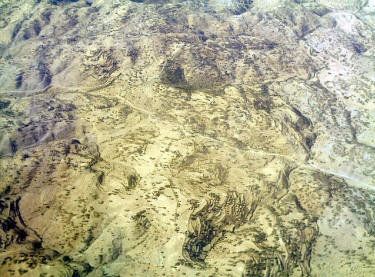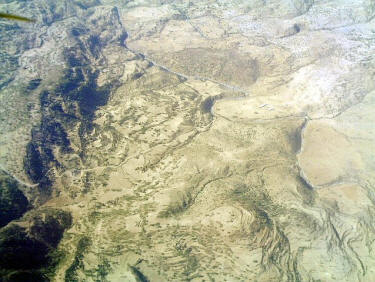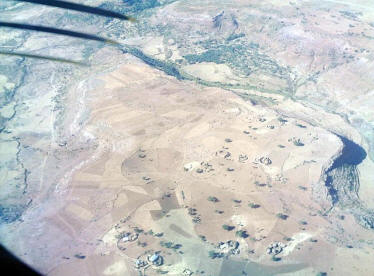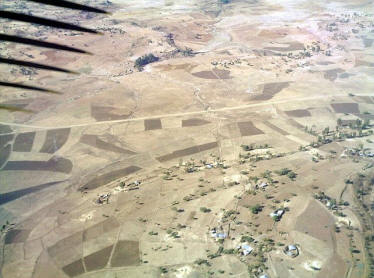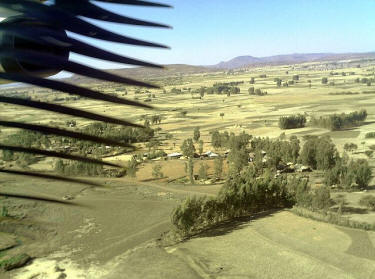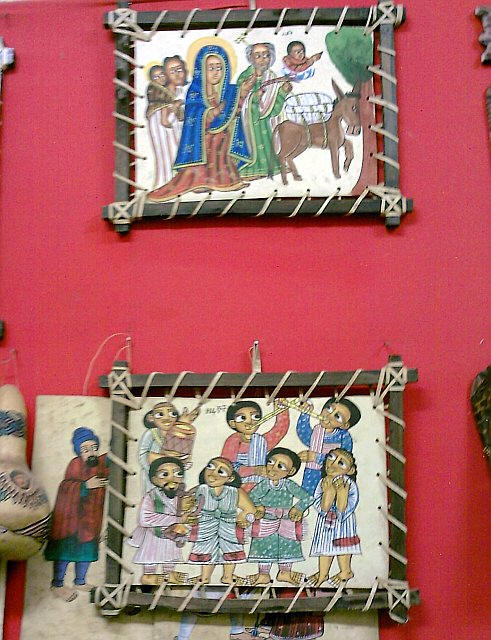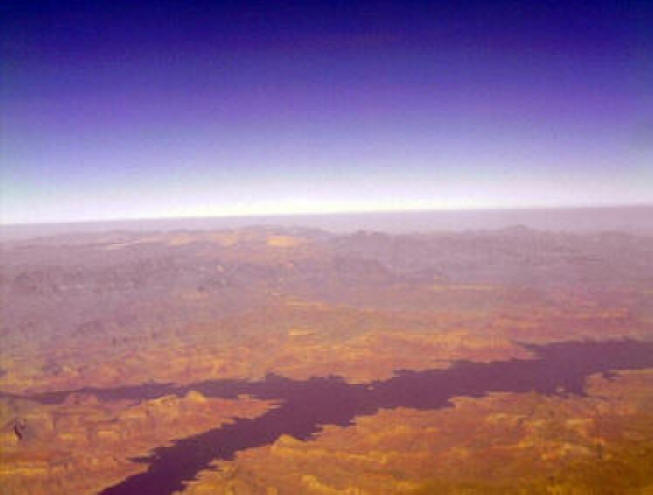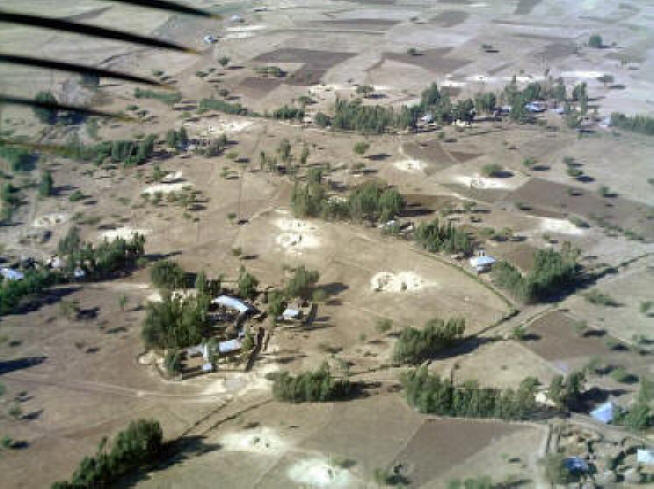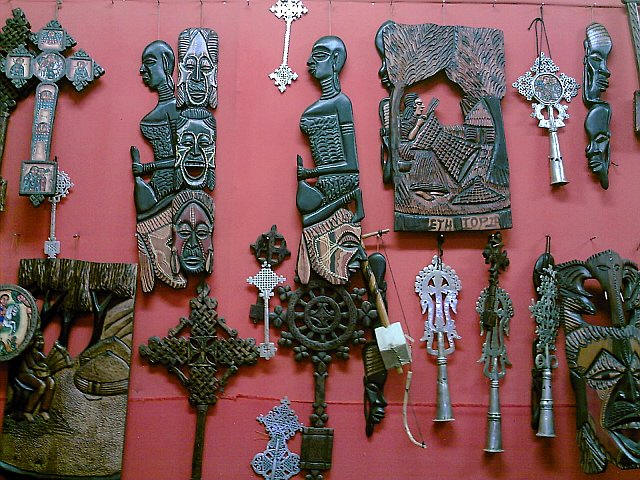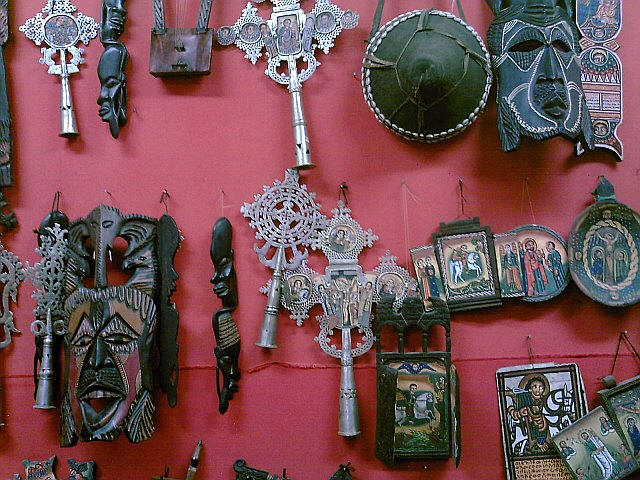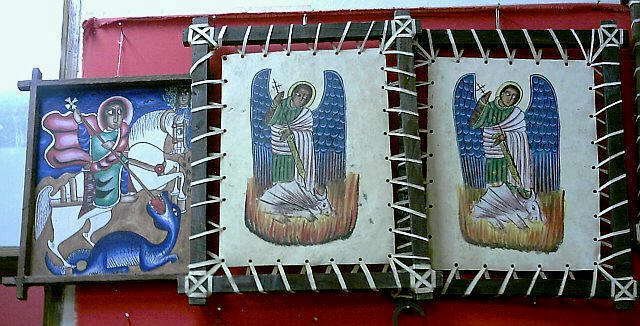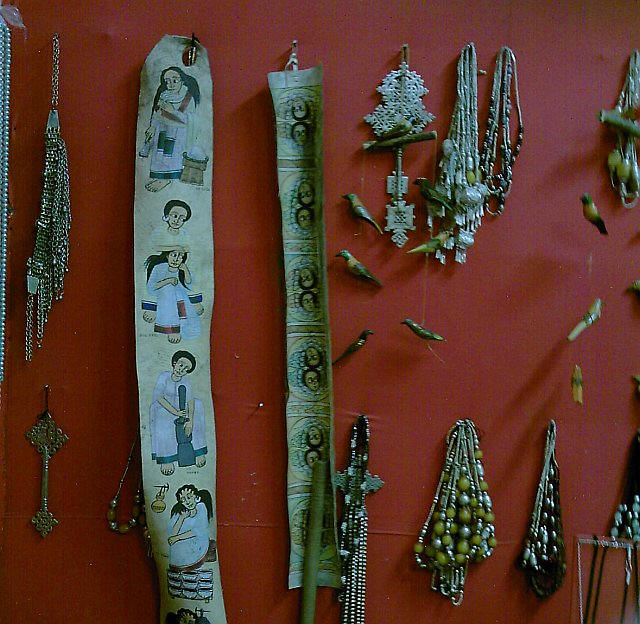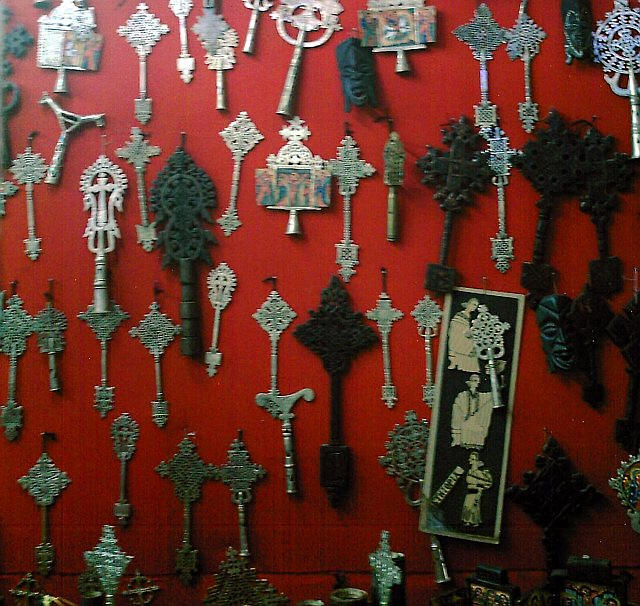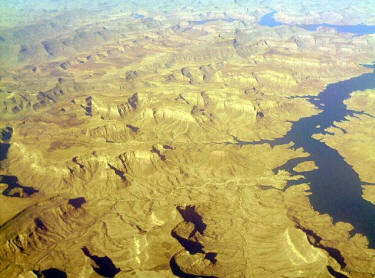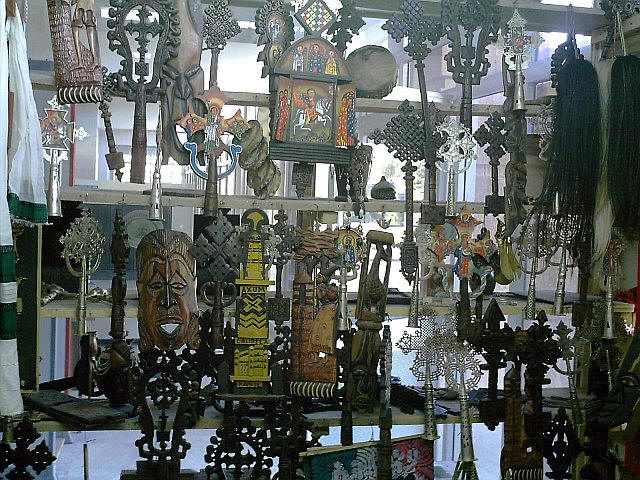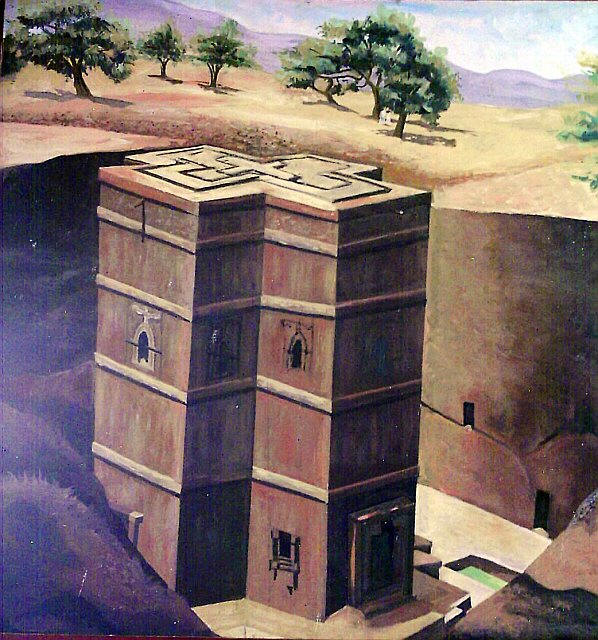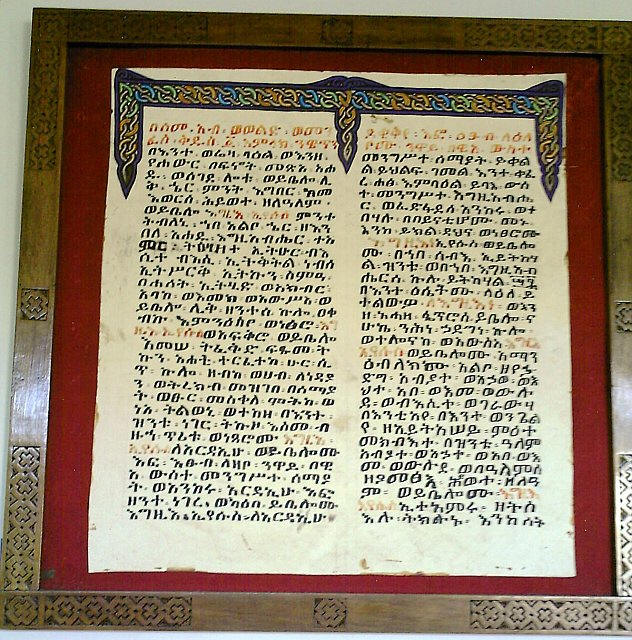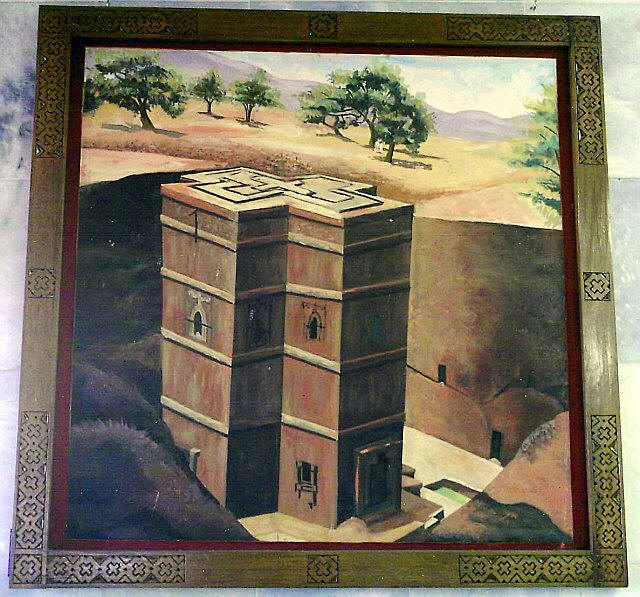


|
Postcards
from:
Las Vegas Nevada Algeciras Spain Rabat Morocco Madrid Spain Yaounde Cameroon Douala Cameroon Addis Ababa Ethiopia Lalibela Ethiopia Axum Ethiopia Gondar Ethiopia Bangkok Thailand Las Vegas Nevada
|
Greetings from Axum Ethiopia, A short early morning flight got me into the Axum area (sometimes spelled: Aksum) with plenty of time to start my explorations on foot. Axum is the northernmost destination along the popular Ethiopian Historical Route. It lies close to the Eritrean border at the heart of the ancient Axumite Empire, the dominant economic and political force in the region for about a millennium prior to its collapse around 900 AD. Inexpensive national airline fares make flying among the several sites attractive. Actually, unless you enjoy long, bumpy four-wheel drive excursions, flying is the only practical way to reach some of these destinations from Addis Ababa, although there is a daily 12 hour deluxe bus service to Gondar leaving at 6AM from the capital.
Walking
towards the mountains in the north the sights along the way make me oblivious to
any possible navigational error. Seeing this lovely scene I pause to find just
the perfect foreground to enhance the view of the distant village cluster on the
ridge. My awkward photographic postures attract an audience. Soon, a couple
school children grow to a dozen, some of whom want to demonstrate the English
they are studying. This day started like so many of my arrivals in a new city. Walking in the direction of the city center some seven kilometers distant should have gotten me there in less than two hours... if I had been walking in the right direction, but somehow I managed to walk in exactly the wrong direction before finally discovering my error. Looking back I realized serendipity had other plans for me this day. Every foreign destination offers the possibility of a range of experiences: natural landscape and cultural attractions usually pale when compared to personal encounters with the local people as far as I'm concerned. Language barriers often provide the incentives needed to really experience the people under natural circumstances. My ever changing audience varied in size from two to two dozen. Here I captured most of the crowd in a single picture while they were stopped to study some unusual action on my part. I think most of them were on their way home from school as it was around noon. Notice most in this crowd are boys. The airport is located north-west of the city and imperfect communications with airport staff, other passengers and the military airport guards at the entrance to the access road led me to believe the cluster of buildings I could see to the north probably would be the town of Axum. So, off I trotted confident in my plan. The Eritrean border unbeknownst to me is less than twenty-five miles away. Around noon after walking a couple hours elementary school kids slowly appeared walking behind me, chattering all the while, obviously about their foreign walking companion. Before long they started paying close attention to my every move as I paused to study my situation, take pictures and good naturedly exchange greetings in languages no one understood very well. Several of the kids demonstrated a rudimentary command of English, showing me their work books at one point. For several hours as I walk briskly in a northerly direction towards the Eretria border I am rarely alone. Here a cowherd finds me as interesting as I find him. Most people I encounter on the highway are at first curious and then inevitably friendly, showing big toothy smiles in return for my own grins. Some attempt to communicate with me, but the language barrier prevents much substantial verbal communication so misunderstandings abound. Still, I have learned from long experience that situational communication usually is more honest and reliable than carefully crafted language, even when both communicators speak the same language! Body language and facial expressions reliably announce: "Hi. I'm friendly and I can see you are also friendly!" Then, pointing at things and directions add to a lively exchange of real information. A words are usually common to both languages like "hotel" or "CocaCola." As I slowed my pace to consider the several indications I might be walking in the wrong direction, two vehicles heading south stopped to inquire why I walked north toward the border way out here in the desolate rural hinterlands of their country: "did I need a ride?" I declined the first truck full of young men who offered to give me a lift, but these three guys were more persuasive with their offer to give me a lift back to the Axum city limits where I explained I wanted to continue my hike of discovery. The fellow on this side spoke some English and translated for the rest who obligingly scrunched together to make room for our four abreast in the single front seat meant for two! With all of us sitting on our hips and me juggling my bulky backpack, we still managed a lively conversation about their country and my curiosities. The sixteen kilometer ride back back to the city limits took only minutes instead of the several hours it would have taken to walk it. Briefly rested from the truck ride into town I resumed my hike of exploration, now heading in the right direction toward the center of town, watching for hotels as I went. The few I found did not inspire. Inquiries established the only really good hotel would be the Yeha Hotel up near the field with all the Stelae and near the church where the Arc of the Covenant is kept. As I walked towards the "center" of town shopping for hotels I could see many students milling around their schools, each group distinguished from the others by unique uniform colors. I marveled how like kids everywhere were these so far from First World civilization. Reaching the hotel situated on a high knoll adjacent to the field of Stelae I discovered a truly wonderful oasis of civilization. Four or five star quality in every respect, what a great disappointment to learn they were fully booked for the night! Now discouraged, I walked back into the business part of town and inquired about flights down to Gondar, my next intended destination. The friendly agent at the Ethiopian Airline office informed me the next flight was scheduled for the following morning. I bought a ticket and then asked if he knew anyplace decent where I could spend the night; the only place I'd been able to find up to that point was a sleeping room with no toilet for $4. His friend's budget motel is showing its age and will never make it into most guide books, but the Kaleb Hotel at 150 Birr ($9) at least got me horizontal and out of the weather and close to the road back to the airport for the daybreak flight early the next morning. The photo here is of the Chapel at the Church of Our Lady Mary of Zion and home of the Ark of the Covenant...so it is said. Legend has it that energy emanating from the object inside the ark is so powerful that anyone looking at it would be instantly killed... or worse. Hmm... No one is allowed to enter this chapel which is guarded by an Ethiopian Orthodox priest who serves for life. Women are not even allowed inside the fence enclosure. I've read rumors that the actual Ark is hidden elsewhere and that only a replica is inside the building, but no one I asked could confirm or deny the rumors. The big main church is off to the side inside a high stone wall and surrounded by a grove of old growth trees. Tourists and touts loiter about. Armed soldiers provide protection, for whom I'm not sure. As the "Ark" is such an important national treasure, the guards may be there to insure its safety, but I'm not sure. Still, Axum is widely believed to be the final resting place of the Ark of the Covenant, a hotly debated claim, but one made with great exuberance by Ethiopians. In a popular book by Graham Hancock, The Sign and the Seal I discovered an enjoyable mix of ancient and modern history of the region and the persistent legends about the Ark of the Covenant. I visited the church where it is supposed to be kept... under lock and key, protected by an ancient priest who alone, is allowed to see the relic... if it does indeed actually exist and resides here in Axum. In today’s Axum the church is surrounded by a wall and many trees which make photography difficult from the outside. One may tour the grounds by paying a small entrance fee. The church sits next to the Field of Stelae, some of the obelisks standing almost a hundred feet tall. This is one view of the field where all the stelae stand. In the foreground we see the giant 33 meter tall column broken in three pieces laying on its side. After walking most of the town I settled on an exploration of the "Field of Stelae" across the street from the Church of Our Lady Mary of Zion and home of the Ark of the Covenant. These obelisks are fashioned from single huge stones and transported from some distance to the site, an amazing feat for people working with primitive tools. While wandering around the ancient artifacts one of the numerous informal "guides" approached me and announced: "Remember me? Yesterday you said you might need my services later." I quickly noted he must have made a fast trip up from Lalibela as that is where I was yesterday and that I didn't recall seeing him down there; he sulked away. Scams abound everywhere; that is a common one. Congressional Reform Act of 2011: Gladys Robinson sent me an interesting chain letter advocating a 28th Amendment to the US Constitution which would limit the perks available to members of congress. Checking it out with Snopes.com proved interesting. The idea behind the letter is commendable, but probably impractical. The Snopes entry is a helpful lesson in civics, however and worth a read. There is little doubt our congress is dysfunctional in terms of serving the interests of the people. What is does in reality is serve the interests of the power elite, the ones who actually make it financially possible for anyone to get elected! Such idealistic efforts like this one are an indication that lots of people are quietly shouting: “I’m not going to take it anymore!” One day one of them might just come up with an idea that works… hopefully short of violent revolution.
Here
is the complete 82 picture
photo album
from Shutterfly which is the successor to Kodakgallery previously used. I like
some of the differences, but the slide show feature seems to crop photos in an
unnatural way. I’ve tried embedding a few photos in the text of this postcard,
but note there is a lot of presentation variation with different browsers and
display resolutions. Let me know if something looks off with your copy. Short 24
hour visit: few photos. Tomorrow morning early I fly down to Gondar. Peace, Fred L Bellomy
|
|
|
|
A few more pictures taken while in Axum Ethiopia. |
|||
|
PRESCRIPT 11 October 2012 Hello from Las Vegas, Nevada; SORRY: As I am about to leave on my next exploration I guess it is time to break the silence. First, an apology to anyone who has written since my last postcard from Lalibela. As usual, since returning from this last expedition I have sequestered myself in the quiet Hermitage for an extended period of hibernation. I too am puzzled by what could cause such anomalous behavior and have intensified study of the brain, neurology and aging. What I have learned makes it perfectly clear such lapses are far from rare, even in nominally normal people as they age. Throughout life our minds are like the knot in a tug-of-war rope: always under tension and being pulled in opposite directions; taught in youth, but increasingly relaxed with age. The source of this phenomenon resides in the way our nervous system has evolved: neurotransmitters to promote and inhibit the firing of individual nerve cells are simultaneously being produced in varying amounts determined by an unlimited number of internal and external influences. So, nothing happens until the complex of neurological networks experiences a clear dominance of signals to act in a particular way… or not... slowing down as we age! In my case at this stage of life, the “OR NOT” frequently prevails. So I'm neither crazy nor antisocial, just older. KODAKGALLERY: O.K. That's the lame psychobabble explanation, but there is another one more down to earth. Shortly after returning from Ethiopia KodakGallery announced they would cease operation on the second of July! They repeatedly sent customers scary warnings to make backup copies of their files! Needless to say, that got my attention. With close to twenty thousand photos in three hundred KodakGallery albums online, I feared the loss of my entire photographic archive. The imminent catastrophe felt like being pursued by a pack of hungry wolves threatening to pounce at any moment. So, I sprang into action and began making backup records of all those captioned images. For several months, every day from sun up to midnight I remained preoccupied with seven Internet connected screens presenting various ongoing conversion processes as I moved KodakGallery images and captions into website pages and optimized the website logic. In the end I did manage to rescue all of the critical materials, creatively augmenting my astonishingly massive site in the process. Tight lipped until after the drop-dead date, Kodak declined to reveal the details of their agreements with Shutterfly, another online photo processing service. To my great relief I lately see that many, perhaps most of my albums are once again available from Shutterfly! BUT, nearly all of the hundreds of links still in my website will need to be converted… and must wait for a long stretch of home-bound rainy days between expeditions. As this is a prescript to the postcard from Axum Ethiopia, I’ll tantalize those interested with the 82 photo Axum slideshow as an example of the new Shutterfly capabilities. An unexpected benefit of all this frenetic activity was the opportunity to relive fifteen years of adventure travel on a compressed time scale. The shortened perspective led to otherwise obscure insights. Needing to read much of the material for image context, I found the writer fascinating and... unfamiliar! It is like reading the work of a stranger who is sampling every risky venue the world has to offer… not exactly the way I consciously approach my actual adventures! PONDERINGS: During these past months in the Hermitage I found myself just sitting a lot: studying, thinking, meditating. One clear advantage of slipping into a vegetative state is that there is a lot of time for pondering... and our world certainly demands a lot of that for anyone not yet brain dead! Why has humanity embraced so many fantastic religious beliefs? Why do a majority of Americans refuse to believe evidence based scientific findings? Why do well meaning zealots fiercely press their ideas on the resisting reluctants? Why has our civilization always tolerated the exploitation of the many by the few? Why do solutions to these and many more critical human problems continue to be so elusive? I cringe at the boisterous exhortations emanating from political podiums and religious pulpits, but suspect it is the only way to get a message through to the majority who find reasoning onerous! Rephrasing the words of a Bahraini bus driver I met: "when the screaming begins all reasoning ceases. One cannot reason with the screamers!" So! How can reason prevail as it must amid all the noise? From my left of center perspective it appears that it is mainly the ultra-conservatives who scream, though I'm sure some ultra-liberal fanatics scream, too. From limited contact with extremists, I conclude they often scream from well memorized internal scripts, never needing to reexamine the original evidence which long ago led them to their fixed positions. Reason plays no role in their behavior! "Understanding who really makes innovation happen" is an article which presents evidence that about 84% of any population is conservative and resists change, leaving only about 16% who are "liberal" and could become change makers. Some of the most spectacular "progress" is made by people who think out of the box, who make waves, who dare to question authority, who refuse to view tradition as sacrosanct! If we ignore all noisy radical thinkers, we run the risk of missing new solutions to old problems and our world clearly is in need of drastic changes unachievable without some sort of truly revolutionary action instigated by such individuals! The trouble makers are a bitter-sweet lot. SCIENTIFIC PERSPECTIVE: At the other extreme are those of us who never take a FIRM unshakable stand on anything - even the best evidence is ALWAYS provisional. That is the scientific imperative! New evidence might be discovered tomorrow that requires a radical paradigm shift! So, we remain forever uncertain about everything; reasonable, but impotent. Can those of us frozen in the middle have any impact on the future course of civilization? Admonishing everyone to avoid the extremes appears pointless, especially if the extreme personality is genetically predisposed. The most extreme anti-scientific conservative of the Religious Right chooses to ignore or disparage the overwhelming evidence for things like Darwinian evolution and man-made climate change. No amount of reasoning is likely to change that dismal fact. We need to learn new tactics from the screamers! The 22 January weekly batch of TED Talks included a 19 minute lecture with the title: "What can atheists learn from RELIGION?" presented by Alain de Botton, a Swiss philosophical writer based on his book entitled: Religion for Atheists. His presentation addresses my very question. RELIGIOUS ATHEISTS: More than one good friend has confided: "You certainly spend an awful lot of time thinking about religious matters for a scientist claiming to be an atheist." Such observations delight me no end for my scientific background is the very reason for a preoccupation with questions of ultimate reality. Believers call that reality "god" and I call it ... what? That's the problem. The secular perspective offers no widely accepted cultural structure for dealing with the non-ordinary reality things that really matter in life. So, I continue to blaze my own trail through the morass of issues that are neither science nor religion. I'm in good company here. Isaac Newton, Charles Darwin, Galileo Galilei and many others all were devoutly religious. I have come to believe the separation of science and religion is an anachronistic artifact which interferes with a deeper understanding of the human condition in the same way Western healing arts traditionally have ignored the integrated relationship between mind and body. My own recent studies while in Africa make it clear the interplay between these two are far from trivial and deserves more serious scientific study. MONEY & POLITICS: In previous postcards lamenting the disparity of wealth distribution throughout the world and within our own country specifically, I speculated the inequities might eventually be corrected by violent revolution and then noted the "occupy" movements could offer a more peaceful alternative. Now I have discovered this provocative analysis entitled: "War or Revolution Every 75 Years. It's time again." If there is another revolution as predicted in the article, the cause will involve the greedy members of the power-elite quietly manipulating the world's economic mechanisms to their own advantage. There must be better ways to eliminate the gross inequities which have evolved in our societies and the political mechanisms which perpetuate them. "Get money out of politics," is a Nation of Change article suggesting an approach which might nudge politicians away from a concealed dependance on ultra-wealthy campaign supporters. In another article, Wealth, Income, and Power, the author presents details on the wealth and income distributions in the United States, and explains how these two distributions are power indicators. From Entera comes: "Dark Ages Redux: American Politics and the End of the Enlightenment", an article about the devolution of civilization, which if not reversed will eventually lead to a time when science itself is once again against the law!
I now have rough drafts for the two
remaining postcards from Ethiopia and hope to get them out before I leave on my
next adventure.
One way American Airline tickets for Istanbul are in hand and I'll be leaving
early Tuesday morning, the 30th of October to explore
Kurdistan in northern
Mesopotamia. On
the way I'll try to visit
Cappadocia
and
Derinkuyu
and
Göbekli
Tepe all in eastern Turkey. More when I finally get the Axum postcard draft
finished. Fred L Bellomy
|
|
